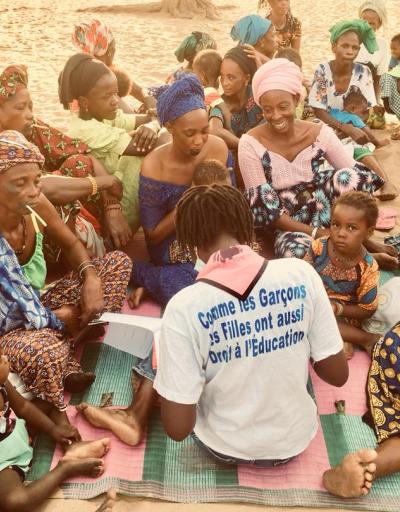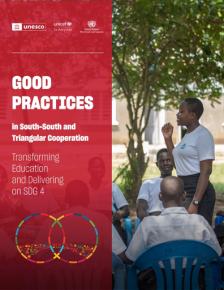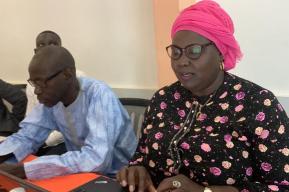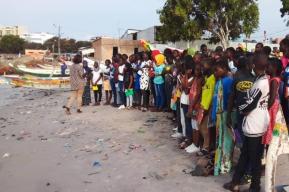In Senegal, the COVID-19 related school closures affected the education of 3.5 million learners, 47% of whom were boys and 53% were girls, in addition to the 1.5 million children already out of school. This is putting the progress made in the country to keep girls in school at risk.
With support from Wallonie-Bruxelles International, UNESCO’s Keeping girls in the picture campaign was rolled out as part of a project in four sub-Saharan African countries: Benin, Mali, Nigeria, and Senegal, with a focus on areas where girls’ dropouts are highest, and girls’ reenrolment is lowest.
The project mobilized youth networks, parent-teacher associations, local leaders and women’s groups through community-based action, and local and national radio and television platforms. Campaign materials and resources were also adapted and translated in three languages, Wolof, Peul and Serere. In the last year, this work has since reached over 30,000 community members, 10,000 girls and young women, 3,000 village chiefs and 50,000 people nationwide through radio.
Mobilizing the community through peer educators
Moussa Amy Dieng took part in one of the community talks organized by UNESCO and the Réseau National des Pairs Educateurs du Sénégal (RENPES), a network of peer educators working to improve health, education, family planning and youth citizenship in Senegal.
A group of 30 peer educators (14 Wolof-speaking, 9 Peul-speaking and 7 Serere-speaking) were trained using campaign materials and equipped with advocacy techniques and key messages on girls’ education. Local Development Committees (LDCs), established by peer educators, provided a space where parents and village chiefs expressed their commitment to address the factors that threaten girls' education and their future, notably early marriage and early and unintended pregnancy.
Caravans travelled across 67 villages, ending their routes at weekly markets to hold forums with marketgoers on questions around girls’ education and their return to or retention in school. These forums were key to building an understanding of parents’ position on girls’ education and reaching communities more widely. Peer educators also held 150 community talks and 50 home visits in these villages to benefit harder-to-reach households.
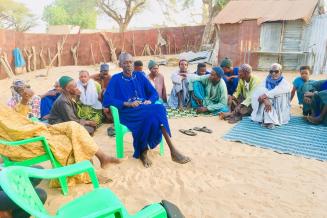
Transforming Khadija’s future
Khadija, aged 10, dropped out of school in second grade to help her mother at her home in Ndindy. She was first made aware of the campaign through her father who attended one of the LDCs. He had returned from the Committee and explained to her that girls should be in school, and that her education was important.
When she saw the caravan enter the Ndindy market, Khadija ran outside to join the forum and listened attentively to the discussion.
This is when Khadija decided to go back to school.
“I am very aware of the messages you have conveyed”, said Khadija to one of the peer educators. “This inspired me to go back to school. I want to become a midwife to help the women in my area, because they face difficulties during childbirth.”
Leaders, parents and local authorities are also feeling the effects of the campaign. "Even if the conditions are difficult in our localities, we parents must encourage and support our children to give them a chance to succeed in their studies”, said Moussa Amy Dieng. “And especially avoid reverting to early marriage and without their consent."
What’s next?
During the forums held at markets, leaders expressed the need to foster girls’ success through the realization of their rights. Since then, local leaders are taking initiatives to sensitize parents to support girls' education and to abandon any practices that might prevent girls from continuing and succeeding in school, such as early and forced marriages.
These local leaders have committed to hold talks in their respective villages to engage heads of households on the importance of girls' education, but also in mosques and in other meeting places for both men and women. The beginning of a new school year will be crucial to begin to appreciate the impact of this important work.
- Read about the work in Nigeria and Mali
- Learn more about UNESCO’s work on gender equality in and through education


